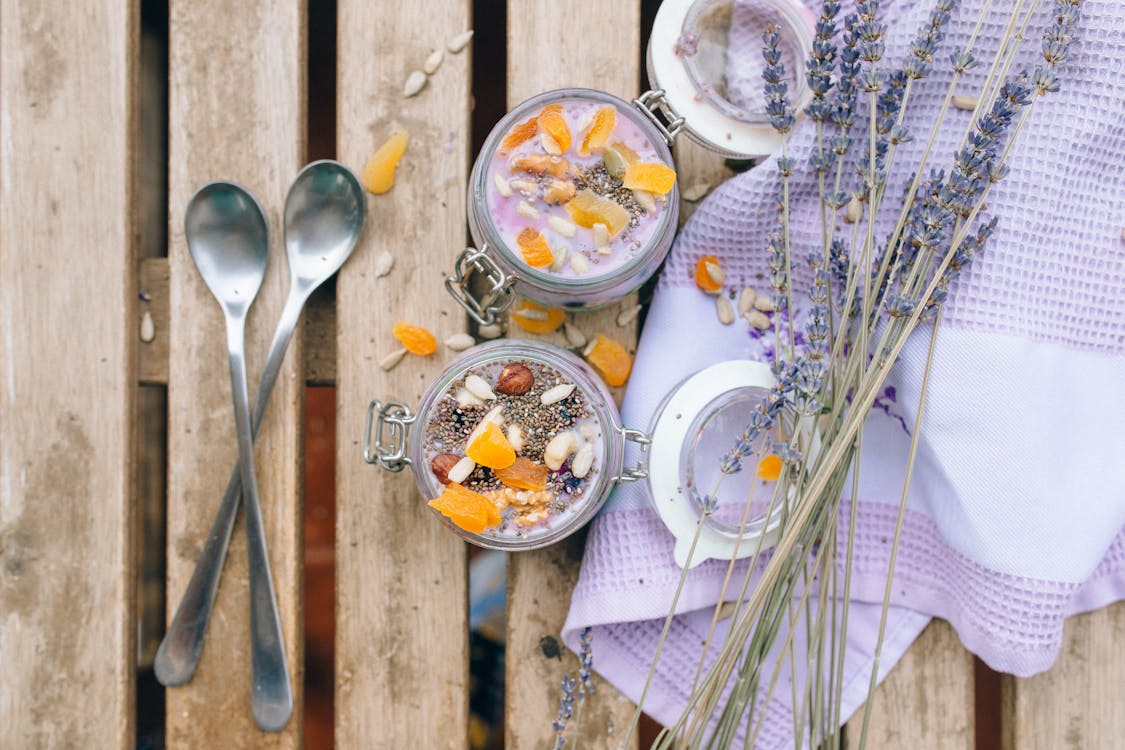
If you’re trying to eat healthy and lose weight, then understanding the concept of energy density is a great way to start eating better. Very basically, energy density refers to the number of calories a food contains. Foods that have a high energy density contain many calories in a small amount of food, whereas foods that have a low energy density contain fewer calories, meaning you can eat more of them.
If you’re eating for weight loss, then sticking to foods that have a lower energy density can help you control your appetite and feel fuller for longer. These foods tend to be higher in both water and fiber. Think whole-grains, fruits, and vegetables.
However, as Ashley Hawkworth of STAG Fitness Nutrition, points out, calories aren’t the only thing that’s important when choosing a healthy snack.
“When we want snacks, many of us reach for the low-calorie options or the low-fat variety. But many of these lack what our body needs – nutrients. You shouldn’t neglect nutrients for the sake of low calories. Look for foods that are high in protein and whole protein sources.”
Your low-calorie snack choices should also be nutritious. Including both protein and fat in your snacks can also help you feel satisfied with what you’re eating, as opposed to plain veggie sticks which technically fill you up, but will likely leave you wanting more.
Simply put, the nutrition content might be worth the extra calories, especially if your healthy diet plan includes plenty of exercise.
So, with that in mind, let’s take a look at 10 healthy, low-calorie options for snacks that are both filling and satisfying.
1. Oats
One cup of cooked oatmeal contains just 154 calories, but oatmeal is a nutrient powerhouse. Loaded with healthy complex carbohydrates (which means they digest more slowly) as well as fiber and protein which leaves you feeling satiated. Oatmeal is such a diverse ingredient that you can customize it in dozens of ways. For savory oatmeal, combine garlic, ginger, mushrooms, spinach, and sesame oil.
For a sweeter oatmeal snack, try overnight oats made with almond milk, vanilla protein powder, yogurt, cinnamon and stevia.

2. Chia Seed Pudding
2 tablespoons of chia seeds soaked in ½ cup of plain almond milk are all you need to make a sweet, heart-healthy snack that’s also low in calories. The healthy omega-3 fatty acids within chia seeds contribute to heart health, and they are high in potassium, iron and calcium. Additionally, they can help balance blood sugar levels which is helpful for appetite control.
Plain chia seed pudding made with almond milk contains only 152 calories, but holds 10g of healthy fat and 11g of fiber, along with 5g of protein. This means it will fill you up. Note that chia seed pudding can have higher calories depending on the recipe you use, what type of milk you use, and whether or not you add toppings such as fruit, peanut butter or granola.
For instructions on how to make this healthy snack, as well as some tasty recipes, check out these delicious chia seed pudding recipes.
3. Egg Bites
One large egg only contains 74 calories and is an excellent source of complete protein as well as other nutrients that can help keep you healthy and strong. Many healthy egg bites or egg cup recipes add vegetables, herbs and small amounts of cheese, which will up the taste factor without adding too many more calories. Eggs cups can be made in batches in the oven, so they’re a perfect option for meal prepping, and the flavor options are endless.
Simply spray a muffin tin with non-stick cooking spray and add whipped eggs and your choice of filling (such as vegetables, cooked chicken, or a small amount of cheese) into each spacer. Bake for around 15 minutes. Eggs can burn easily, so keep a close eye on them while they’re in the oven.
4. Greek Yogurt
One cup of plain full-fat Greek yogurt contains 220 calories, while its non-fat counterpart contains 134 calories. However, it’s important to consider the nutrient content, not only the caloric difference.
Non-fat yogurt is a better source of calcium, B12, and zinc, but if you’re looking to control your appetite, full-fat yogurt may be the better way to go. Researchers have discovered that full-fat dairy tends to help with maintaining a healthy weight, and it has been speculated that this is because the higher fat content elicits feelings of fullness
.
Combine your greek yogurt with dill, cucumber, lemon, and garlic to enjoy a Tzaziki dip with celery sticks, or mix in fresh low-cal berries and a tiny amount of honey for a sweeter snack.
5. Cup of Soup
Soup can be an incredibly healthy snack, but not the store-bought microwavable kinds that come loaded with sodium and sugar. However, a big homemade batch of soup can be a quick, filling snack that is low in calories and high in nutrient content. Plus, if you have a thermos, you can take it with you anywhere. Vegetable or chicken stock is easy enough to make on your own, but if using store-bought be sure to check the sodium content.
The caloric content of soup will depend on what you put into it. Plain broth has the fewest calories, but healthy add-ins like vegetables, lentils, and pulled chicken will help you add in proteins and fibers that will keep you feeling full.

6. Popcorn
Air-popped plain popcorn is much healthier than the pre-packaged microwave varieties. One cup of popcorn contains just 31 calories. A tablespoon of olive oil or coconut oil adds around 119 calories, which is still healthy.
Popcorn is a very healthy choice to snack on as it is loaded with satiating fiber. In fact, some people report feeling more full after eating popcorn than they do after eating chips. Popcorn is also full of antioxidants that can help fight off disease and improve digestive health.
7. Beef Jerky
Beef jerky or other types of jerky are a great option for those of you watching your carb intake. “These snacks have been attacked in the media before, but they’re largely empty claims,” says Ashely Hawsworth. “If possible, check with your butcher, as they can be a great source for these products. [Jerky] will be relatively low in calories, and protein itself is satiating.” While many brands of jerky tend to have a very high sodium content, if carefully selected, beef or turkey jerky can be a great option while maintaining a healthy diet. 1 large piece of beef or turkey jerky contains roughly 80-85 calories. Just be sure to carefully read the label and be mindful of the sodium content, as well as any added flavors like teriyaki.
8. Deli Meat Roll-Ups
Prep a container of healthy two-bite roll-up made from deli meat such as roast beef, turkey or roast chicken slices from your local deli. This is a low-carb snack, and very high in protein and healthy fats. Deli meats tend to be lower in calories but, similar to jerky, it’s important to be mindful of the sodium content. Keep this in mind if you are using condiments such as mustard or cream cheese as well. To keep it low-cal, wrap turkey or chicken breast slices around cucumber, lettuce, or pickles for an easy and healthy snack.
9. Kale Chips and Other Veggie Chips
Store-bought chips are usually high in calories, sodium and saturated fat, but you can make your own, healthier version of chips out of kale, beets, turnips, rutabagas and even radishes. Thinly slice your veggies using a mandolin, thinly coat in oil, season with salt and pepper and bake for around 20 minutes, tossing halfway through. Alternatively, you can make these veggie chips in an air fryer, so that they contain no oil.
10. Smoothies
A healthy smoothie is a filling, portable snack and a great option for anyone trying to increase their daily intake of fruits or vegetables. They can be blended up quickly and the flavor options are limitless.
The number of calories will vary depending on your smoothie recipe, but figuring it out is as easy as breaking down your ingredients list and plugging them into a calorie counter, or using this handy chart of staple smoothie ingredients.
An example of a healthy smoothie recipe is unsweetened almond milk, a handful of low-cal berries such as strawberries, and half a banana.
Find Out the Optimal Diet Plan For You, Based on Your DNA
Did you know that your genes can partly determine your ideal diet plan? Some people benefit from a diet that is lower in carbs, while others might find more success following a low-fat diet. Your optimal diet plan can be revealed after taking a DNA test from CircleDNA, where you can read your genetic diet and nutrition reports.






Comments are closed.